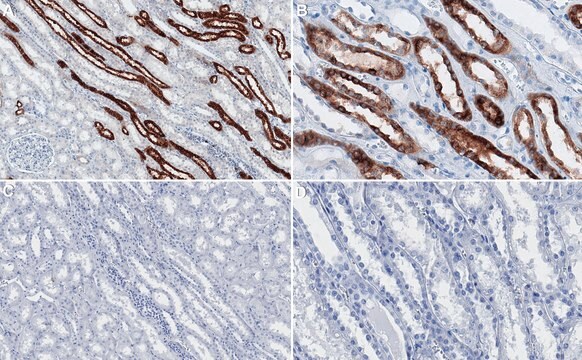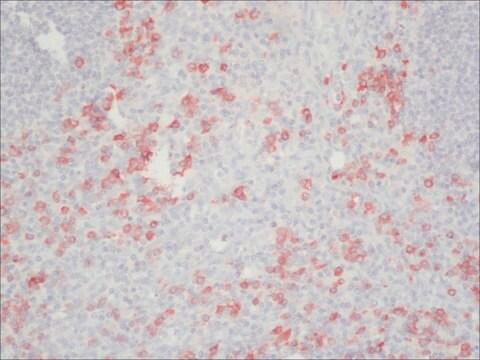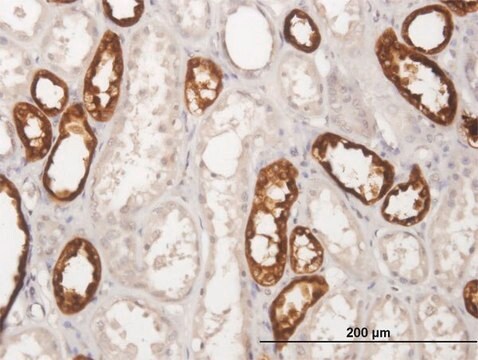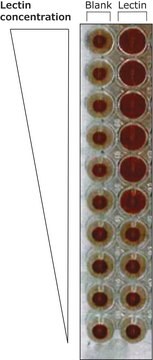推薦產品
生物源
human
品質等級
化驗
>95%
形狀
solid
製造商/商標名
Chemicon®
技術
activity assay: suitable
NCBI登錄號
UniProt登錄號
運輸包裝
wet ice
基因資訊
human ... UMOD(7369)
一般說明
Research area: Immuno and CKS
Tamm-Horsfall glycoprotein (THGP) also known as uromodulin is abundantly present in mammalian urine. It is highly expressed in the thick ascending limb of the Henle′s loop in the kidney. This protein consists of three epidermal growth factor (EGF) domains and a zona pellucida-like domain. THGP is a member of the glycosylphosphatidylinositol (GPI) protein family and is attached to the cell membrane by a C-terminal GPI- anchor. The THGP gene is located on the human chromosome at 16p12.3.
Tamm-Horsfall glycoprotein (THGP) also known as uromodulin is abundantly present in mammalian urine. It is highly expressed in the thick ascending limb of the Henle′s loop in the kidney. This protein consists of three epidermal growth factor (EGF) domains and a zona pellucida-like domain. THGP is a member of the glycosylphosphatidylinositol (GPI) protein family and is attached to the cell membrane by a C-terminal GPI- anchor. The THGP gene is located on the human chromosome at 16p12.3.
應用
Tamm-Horsfall Glycoprotein has been used in luciferase activity assay of immortalized proximal tubular cells and human primary proximal tubular epithelial cells. It has also been used as a standard for calibration of uromodulin in urine samples.
生化/生理作用
Tamm-Horsfall glycoprotein (THGP) may play a role in antibacterial host defense, inflammatory kidney disease, and the urogenital tract. It exhibits protective effects against kidney stone formation by reducing the calcium oxalate precipitation. Mutations in the THGP gene lead to familial juvenile hyperuricemic nephropathy (FJHN), glomerulocystic kidney disease (GCKD), and medullary cystic kidney disease type 2 (MCKD-2).Tamm-Horsfall Protein (THP) mediates the formation of mucous coat of the bladder, thereby regulating the permeability of the ascending loop of Henle. THP is known to adhere to Escherichia coli strains with type 131 and type S32 fimbriae, thereby blocking their interaction with the uroepithelium. Additionally, THP activates cells by directly signaling through Toll-like receptor 4 (TLR4). It has been demonstrated that THP stimulates the production of tumor necrosis factor-alpha (TNF-α) and tissue factor in monocytes through TLR4.
外觀
Lyophillized from deionized water containing 0.02% sodium azide.
儲存和穩定性
Store +2-8°C for up to 3 months after date of receipt.
DO NOT FREEZE.
DO NOT FREEZE.
法律資訊
CHEMICON is a registered trademark of Merck KGaA, Darmstadt, Germany
免責聲明
Unless otherwise stated in our catalog or other company documentation accompanying the product(s), our products are intended for research use only and are not to be used for any other purpose, which includes but is not limited to, unauthorized commercial uses, in vitro diagnostic uses, ex vivo or in vivo therapeutic uses or any type of consumption or application to humans or animals.
儲存類別代碼
11 - Combustible Solids
水污染物質分類(WGK)
WGK 1
閃點(°F)
Not applicable
閃點(°C)
Not applicable
分析證明 (COA)
輸入產品批次/批號來搜索 分析證明 (COA)。在產品’s標籤上找到批次和批號,寫有 ‘Lot’或‘Batch’.。
Julie A D Van et al.
Molecular & cellular proteomics : MCP, 19(3), 501-517 (2019-12-28)
Chronic hyperglycemia is known to disrupt the proteolytic milieu, initiating compensatory and maladaptive pathways in the diabetic kidney. Such changes in intrarenal proteolysis are captured by the urinary peptidome. To elucidate the early kidney response to chronic hyperglycemia, we conducted
Aparna Renigunta et al.
The Journal of biological chemistry, 286(3), 2224-2235 (2010-11-18)
Tamm-Horsfall glycoprotein (THGP) or Uromodulin is a membrane protein exclusively expressed along the thick ascending limb (TAL) and early distal convoluted tubule (DCT) of the nephron. Mutations in the THGP encoding gene result in Familial Juvenile Hyperuricemic Nephropathy (FJHN), Medullary
Noel Edwards et al.
Nephrology, dialysis, transplantation : official publication of the European Dialysis and Transplant Association - European Renal Association, 32(12), 1994-1999 (2017-06-13)
Heterozygous mutations in UMOD encoding the urinary protein uromodulin are the most common genetic cause of autosomal dominant tubulointerstitial kidney disease (ADTKD). We describe the exceptional case of a patient from a consanguineous family carrying a novel homozygous UMOD mutation
我們的科學家團隊在所有研究領域都有豐富的經驗,包括生命科學、材料科學、化學合成、色譜、分析等.
聯絡技術服務








